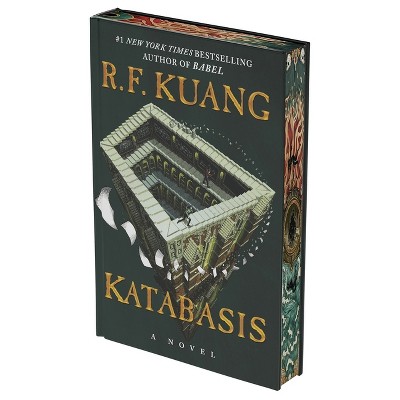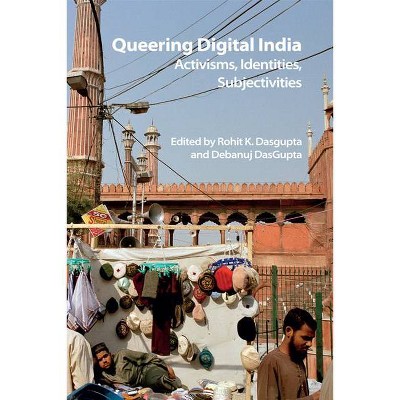Sponsored

Women, Wealth and the State in Early Colonial India - (States Before Modernity) by Nicholas J Abbott
$121.40Save $3.60 (3% off)
In Stock
Eligible for registries and wish lists
Sponsored
About this item
Highlights
- Few polities were more instrumental to the rise of the East India Company and the advent of British colonial rule in South Asia than the Mughal successor state of Awadh (c. 1722-1856).
- About the Author: Nicholas Abbott is Assistant Professor in the Department of History at Old Dominion University in Norfolk, Virginia.
- 312 Pages
- History, Asia
- Series Name: States Before Modernity
Description
About the Book
Examines wealthy Indian matriarchs as essential makers of states--and ideas of 'the state'--in pre- and early colonial IndiaBook Synopsis
Few polities were more instrumental to the rise of the East India Company and the advent of British colonial rule in South Asia than the Mughal successor state of Awadh (c. 1722-1856). And few individuals influenced the making of the Awadh regime and its pivotal relationship with the Company more than the chief consorts (begams) of its ruling dynasty. Drawing on previously unexamined Persian sources, this book centres the begams of Awadh within a revised history of state-formation and conceptual change in pre- and early colonial India. In so doing, it posits the begams as essential, if contested, builders of both the Awadh regime and the Company state, and as ambivalent partners in forging evolving political economies and emerging conceptual languages of statehood and sovereignty in early colonial India.Review Quotes
Nicholas Abbott is breaking new ground in writing about South Asia's eighteenth century from predominantly Persian source materials. This monograph offers a fresh approach to early colonial history as well as an exhaustive and imaginative treatment of source material. Abbott is particularly innovative in using philological and semiotic tools to think about the evolving concept of "sarkar" and in his capacious and thoughtful treatment of gender; by foregrounding the role of Awadh's matriarchs, he presents a gender-sensitive reading of state and colonialism at a time of profound transition.--Samira Sheikh, Vanderbilt University
An erudite, thorough and thoughtful break with androcentric colonial-postcolonial historiography of 'the native state'. Abbott's book also pioneers as the first monograph on women in propertied households as pivots of early modern South Asian finance and political culture. It considerably deepens modern feminist debates on Indian women's political and property rights--Indrani Chatterjee, University of Virginia
About the Author
Nicholas Abbott is Assistant Professor in the Department of History at Old Dominion University in Norfolk, Virginia. His research focuses on gender, politics, and state formation in Mughal and colonial India and has been published in the Journal of the Economic and Social History of the Orient, Itinerario and Modern Asian Studies.
Dimensions (Overall): 9.21 Inches (H) x 6.14 Inches (W) x .75 Inches (D)
Weight: 1.35 Pounds
Suggested Age: 22 Years and Up
Series Title: States Before Modernity
Sub-Genre: Asia
Genre: History
Number of Pages: 312
Publisher: Edinburgh University Press
Theme: India & South Asia
Format: Hardcover
Author: Nicholas J Abbott
Language: English
Street Date: October 31, 2024
TCIN: 91463799
UPC: 9781399526463
Item Number (DPCI): 247-02-0685
Origin: Made in the USA or Imported
If the item details aren’t accurate or complete, we want to know about it.
Shipping details
Estimated ship dimensions: 0.75 inches length x 6.14 inches width x 9.21 inches height
Estimated ship weight: 1.35 pounds
We regret that this item cannot be shipped to PO Boxes.
This item cannot be shipped to the following locations: American Samoa (see also separate entry under AS), Guam (see also separate entry under GU), Northern Mariana Islands, Puerto Rico (see also separate entry under PR), United States Minor Outlying Islands, Virgin Islands, U.S., APO/FPO
Return details
This item can be returned to any Target store or Target.com.
This item must be returned within 90 days of the date it was purchased in store, shipped, delivered by a Shipt shopper, or made ready for pickup.
See the return policy for complete information.
Frequently bought together

Trending Non-Fiction

$19.31
was $20.98 New lower price
4 out of 5 stars with 64 ratings

$18.28
was $19.58 New lower price
4.7 out of 5 stars with 15 ratings

$4.59
MSRP $7.99
Buy 2, get 1 free select books
4.8 out of 5 stars with 123 ratings

$6.20
MSRP $10.95
Buy 2, get 1 free select books
4.8 out of 5 stars with 33 ratings

$7.09
MSRP $9.99
Buy 2, get 1 free select books
4.9 out of 5 stars with 46 ratings











